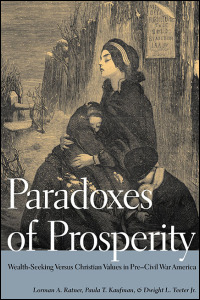 When working with Professor Lorman (Larry) Ratner on another University of Illinois Press book (Fanatics and Fire-Eaters: Newspapers and the Coming of the Civil War, 2003), he frequently said that there was a prominent, if now largely forgotten theme, in the press. That theme is the subject of our new book, Paradoxes of Prosperity: Wealth-Seeking Versus Christian Values in Pre-Civil War America.
When working with Professor Lorman (Larry) Ratner on another University of Illinois Press book (Fanatics and Fire-Eaters: Newspapers and the Coming of the Civil War, 2003), he frequently said that there was a prominent, if now largely forgotten theme, in the press. That theme is the subject of our new book, Paradoxes of Prosperity: Wealth-Seeking Versus Christian Values in Pre-Civil War America.
Generally, the 1850s were a time of optimism and great prosperity: the nation now stretched from sea to sea. New lands gained by the Mexican War awaited western settlement, there was gold in California, and business opportunities abounded. Such optimism and prosperity, however, were shadowed by frequently expressed anxiety that with too much wealth, republican and Christian values would be lost. As historian John Nerone noted, an American of the mid-nineteenth century was expected to be “a virtuous member of the body politic devoted to the public good.”
When we began Paradoxes of Prosperity, we knew that the 1850s were a time of the maturation of true mass media. Steam power drove faster and faster printing presses for mass-market newspapers, magazines, and book publishing. Widespread rail lines and favorable mail rates aided newspaper, magazine and book circulation, and the increasing use of the “magnetic telegraph” offered unprecedented triumphs over time and distance in moving information.
This project gave us a greater appreciation for the growing role of women in the communication revolution of the 1850s. Godey’s Ladies’ Book, edited by Sarah Hale, was second in readership only to Harper’s magazine. Godey’s thrived on writings of women eager to write about important issues of that day. Women, traditionally excluded from the political and cultural debates of the nineteenth century, used publishers’ eagerness to make money to express their own views to a rapidly growing reading public.
Harriet Beecher Stowe (Uncle Tom’s Cabin), Susan Warner (The Wide Wide World), and Maria Cummins (The Lamplighter) all wrote prodigious best-sellers. Their novels all addressed aspects of the prosperity-morality paradox. And, as a Literary World editor asserted in 1850, the novel had become, like the newspaper and the pamphlet, ” … a legitimate mode of influencing public opinion, an indispensable organ in the discussion of any party question or set of opinions.” Some male writers were envious of the women’s successes. Nathaniel Hawthorne, whose works were far outsold by female authors, dismissed them as “scribbling women.”
We think Larry would be proud of this book, and we thank the University of Illinois Press and its people for the thoughtful care given to publishing Paradoxes of Prosperity.
*****
Lorman A. Ratner was a professor of history, dean of the College of Arts & Sciences, and director of the Center of Multicultural Studies at the University of Tennessee, Knoxville. He died in 2007 as he worked to complete the manuscript for this book. He worked with his wife, Paula T. Kaufman, university librarian and dean of libraries at the University of Illinois at Urbana-Champaign, and with Dwight L. Teeter Jr., professor of journalism & electronic media at the University of Tennessee.
